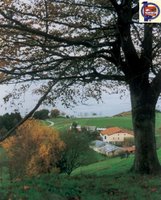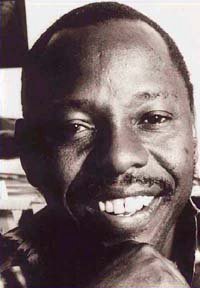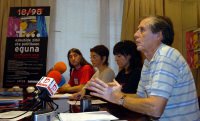PC&P (Pictures, Culture & Politics) P & C (Papers & Coffee) PP&P (Pub, Pint & Peanuts)
Tuesday, November 29, 2005
Monday, November 28, 2005
i'm bloggin' it

What are blogs for?
Are they a new kind of cyber-journalism?
The tool that any egocentric needs?
The perfect window for a voyeur?
A desperate cry in times of overcrowded mass-loneliness?
A modern version of the old stamp album collection?
A diary?
A try in putting that minority language in the cyber space so luckily an American can know that you exist? (The benign version of “War is the tool God uses to teach Geography to Americans”? Who needs wars when you have Google Hearth).
Are we in the beginning of something or is just another brick in the wall of compulsive consumism?
Are we going to make the world a better place with all this new-technologies bullshit?
Or is just that we want to save our souls mentioning Sarajevo, Hiroshima, Gernika, Auschwitz and the like?
Sunday, November 27, 2005
Saturday, November 26, 2005
The Saturday Poem

Our Own Land
There is no one in the world more tearless,
more proud, more simple than us.
1922
We don't wear it in sacred amulets on our chests.
We don't compose hysterical poems about it.
It does not disturb out bitter dream-sleep.
It doesn't seem to be the promised paradise.
We don't make of it a soul
object for sale and barter,
and we being sick, poverty-stricken, unable to utter a word
don't even remember about it.
Yes, for us it's mud on galoshes,
for us it's crunch on teeth,
and we mill, mess and crush
that dust and ashes
that is not mixed up in anything.
But we'll lie in it and be it,
that's why, so freely, we call it our own.
Leningrad, 1961
ANNA AKHMATOVA
Saturday, November 19, 2005
Sunday, November 13, 2005
1421
On 8 March 1421, the largest fleet the world had ever seen set sail from China. The ships, some nearly five hundred feet long, were under the command of Emperor Zhu Di's loyaul eunuch admirals. Their orders were "to proceed all the way to the end of the earth".
The voyage would last for two years and by the time the fleet returned, China was beginning its long, self-imposed isolation from the world it had so recently embraced. And so the great ships were left to rot, and the records of their journey destroyed. And with them, the knowledge that the Chinese had circumnavigated the globe a century before Magellan and Elkano, reached America seventy years before Columbus, and Australia three hundred and fifty years before Cook.
More information in: www.1421.tv
Saturday, November 12, 2005
The Saturday Poem
They fuck you up, your mum and dad.
They may not mean to, but they do.
They fill you with the faults they had
And add some extra, just for you.
But they were fucked up in their turn
By fools in old-style hats and coats,
Who half the time were soppy-stern
And half at one another's throats.
Man hands on misery to man.
It deepens like a coastal shelf.
Get out as early as you can,
And don't have any kids yourself.
PHILIP LARKIN
Thursday, November 10, 2005
Remember Saro-Wiwa
Kenule Beeson Saro-Wiwa (October 10, 1941 - November 10, 1995) was a Nigerian author, television producer and environmental activist.
Ken Saro-Wiwa was a member of the Ogoni, an ethnic minority whose homelands in the Niger Delta have been targeted for oil extraction since the 1950s. As president of the Movement for the Survival of the Ogoni People (MOSOP), Saro-Wiwa led a nonviolent campaign against environmental damage associated with the operations of multinational oil companies, including Shell and British Petroleum.
Saro-Wiwa was also a successful businessman, novelist and television producer. His best known novel, Sozaboy: A Novel in Rotten English, tells the story of naive village boy recruited to the army during the Nigerian civil war (1967-1970). His war diaries, On a Darkling Plain, document Saro-Wiwa's experience during the war, when he served as the Civilian Administrator for the port of Bonny in the Niger Delta. His satirical television series, Basi & Co., is purported to have been the most watched soap opera in Africa.
In the early 1970s, Saro-Wiwa served as the Regional Commissioner for Education in the Rivers State Cabinet, but was dismissed in 1973 because of his support for Ogoni autonomy. In the late 1970s, he established a number of successful business ventures in retail and real-estate, and during the 1980s was able to concentrate on his writing, journalism and television production.
In 1990, Saro-Wiwa founded MOSOP, to advocate for the rights of the Ogoni people. The Ogoni Bill of Rights, written by MOSOP, set out the movement's demands, including increased autonomy for the Ogoni people, a fair share of the proceeds of oil extraction, and remediation of environmental damage to Ogoni lands. In 1992, Saro-Wiwa was imprisoned for several months, without trial, by the Nigerian military government.
In January 1993, MOSOP organised peaceful marches of around 300,000 Ogoni people - more than half of the Ogoni population - through four Ogoni centres, drawing international attention to his people's plight. The same year, Shell ceased operations in the Ogoni region.
Saro-Wiwa was arrested again and detained by Nigerian authorities in June 1993, but was released after a month. In May 1994, he was arrested and accused of incitement to murder following the deaths of four Ogoni elders, believed to be sympathetic to the military. Saro-Wiwa denied the charges, but was imprisoned for over a year before being found guilty and sentenced to death by a specially convened tribunal. The trial was widely criticised by human rights organisations.
On November 10, 1995, Saro-Wiwa and eight other MOSOP leaders were executed (hanged) by the Nigerian military government of General Sani Abacha, provoking the immediate suspension of Nigeria from the Commonwealth of Nations, which was meeting in New Zealand at the time.
A biography, In the Shadow of a Saint, was written by his son, journalist Ken Wiwa. Ken Saro-Wiwa's daugher Zina Saro-Wiwa is a filmmaker and arts journalist.
"I repeat that we all stand before history. I and my colleagues are not the only ones on trial. Shell is on trial here, and it is as well that it is represented by counsel said to be holding a watching brief. The company has, indeed, ducked this particular trial, but its day will surely come and the lessons learned here may prove useful to it, for there is no doubt in my mind that the ecological war the company has waged in the delta will be called to question sooner than later and the crimes of that war be duly punished. The crime of the company's dirty wars against the Ogoni people will also be punished.
On trial also is the Nigerian nation, its present rulers and all those who assist them. I am not one of those who shy away from protesting injustice and oppression, arguing that they are expected of a military regime. The military do not act alone. They are supported by a gaggle of politicians, lawyers, judges, academics and businessmen, all of them hiding under the claim that they are only doing their duty, men and women too afraid to wash their pants of their urine.
We all stand on trial, my lord, for by our actions we have denigrated our country and jeopardised the future of our children. As we subscribe to the subnormal and accept double standards, as we lie and cheat openly, as we protect injustice and oppression, we empty our classrooms, degrade our hospitals, and make ourselves the slaves of those who subscribe to higher standards, who pursue the truth, and honour justice, freedom and hard work."
My brothers
My brothers,
and sisters
dance, dance, dance, dance
dance your anger
and your joys
dance the military guns to silence...
dance, my people
for we have seen tomorrow
and there is
anOgoni
star in the sky.
Wednesday, November 09, 2005
The Spanish Inquisition

Inquisitorial campaign not over yet
With court case 18/98 due to start in Madrid on November 21st against 59 Basque citizens representing a wide range of social and political entities, the grass-roots campaign in support of the victims of this political witch hunt is warning that the Spanish law courts' offensive is not over yet.
Speaking on Tuesday, lehendakari Ibarretxe dismissed the recent trial in Bilbao against Juan María Atutxa, Gorka Knörr and Kontxi Bilbao [Gara English Weekly, October 26] as 'the tail of the comet launched by the PP [the right-wing party ruling in Spain until last year's elections] in the courts'.
Teresa Toda, speaking for the 18/98+ platform, disagrees emphatically. She believes the worst of Spain's inquisitorial strategy against Basque activists, set in motion by former president Jose María Aznar, is yet to come:
'The head of that comet, which denies the rights of individuals and of the entire Basque society, is still alive and society should be very aware of that fact, because while some talk about 'the tail end of the comet' we haven't had the head yet, and its about to crash down on Euskal Herria,' she warned.
Toda was speaking in Bilbao in an appearance with other members of the 18/98+ campaign who had met to assess the Kaiera campaign.
Mariano Ferrer, a popular retired journalist and supporter of the campaign, said that the different court cases included in the 18/98 macro-trial 'hold no water', which is why, in his opinion, 'they are having such a hard time getting the court trials started'.
'Eight years have passed since judge Baltasar Garzón had the [Basque newspaper] Egin shut down, and that trial still hasn't come up,' Ferrer pointed out.
According to the veteran current affairs analyst, these trials amount to rights violations: 'They represent a distortion of the justice system in any state subject to the rule of law, because these are politically motivated trials with a specific goal, in a well-defined political climate, which do not merely threaten but actually nullify the civil and political rights of individuals, businesses and a variety of entities.'
But, he said, such violations do not only affect those directly accused in the trials themselves but 'affect us all, because in a democratic society rights are indivisible; when a right is threatened and nothing is done to defend it, it is always a step backwards.'
Sunday, November 06, 2005
The Sun Survey
Clearly is easier to read the text but I wonder if the old black background was more stylish and suited better to my poetry-driven face...
Could my loyal 3 or 4 readers please place a comment making clear which is your choice?
One coffee One vote!
Popular democracy!
Power to the masses!
Etc!





